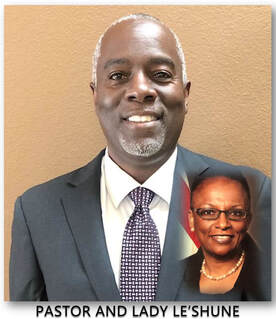Price Chapel AME Church
Temporary Address:
Emmanuel - H.M. Turner AME Church
5202 Compton Avenue, Los Angeles, CA 90011
Sunday Service is at 11:00am
|
As Price Chapel AME Church launches into the next dimension of inclusive Christian service, It is an honor and pleasure to have Rev. Jeffery Clark and his spouse Mrs. Le'Shune Clark as our pastor and first lady. We are blessed by his leadership, wisdom, strength, commitment, guidance, and direction.
We are ready for a new commencement as the church on the corner of Alviso and Slauson elevates to a new domain of excellence and greatness. Here at Price, our doors are wide open in hopes to create an environment of unity filled with love where you can connect with people, learn about Christ and grow in your faith. We love you in the Lord and there’s nothing you can do about it. |
OFFICE CONTACT4000 W. Slauson Ave, Los Angeles 90043
SUNDAY Service - 11:00am Sunday School - 8:30am (323) 296-2406 office email: [email protected] |
PRICE CHAPEL AME CHURCH
|
BIBLE STUDIESMorning Bible Study Wednesday Daytime 11:00 am Evening Bible Study Tuesday Evening 6:00 pm |
Price Chapel Bible Study Q & A
Why did Paul say that they were not like the Gentiles born into sin? Keeping this quote in context, Paul is addressing Peter’s behavior when others from Jerusalem come to town, and in their absence. Paul notes that Peter openly eats with the Gentiles while others from the Jewish leadership are around, but reframe from eating with them while they are there. When we get to verse fifteen we find the subject quote. However, we need to go back to verse six of that same chapter. “But from those who seemed to be something; whatever they were, it makes no difference to me; God shows personal favoritism to no man; for those who seemed to be something added nothing to me.” Here Paul makes it plain that the Jews are not better than the Gentiles. To my best understanding, Paul is suggesting that the Jews were born into the covenant relationship because of the faith of Abraham. Yet, they each must have a faith relationship with Jesus. The same is true for the Gentiles, they must have a faith relationship. Thus, I believe Paul was using extreme language to grab their attention that if you who are born in a right relationship are sinners and may be saved by Grace; so to are those who were born into sin and accept Jesus.
What do the ashes mean for Ash Wednesday? Ashes have a symbolic meaning besides the overdone mourning and repentance theme. Another meaning is mortality. Dust we are, and to dust we shall return. Our bodies are made up of the same stuff as the dust of the earth, and to the dust of the earth we shall return. But we are more than our bodies, we are also Spiritual beings animated by the Breath of God. As Spirit, we belong to God eternally. Another symbolic meaning of ashes is cleansing. Before the development of soap, ashes were used for cleaning. As an abrasive, ashes were scrubbed on and then washed off with water. Ashes as a cleaning agent might be a helpful way to view the “ashes” situations in our lives; they cleanse us and prepare us for what comes next.
What are the core principles of Christianity?
.As Christians, there are a multitude of things we believe. Yet, across the various denominations there are some core principles that we all adhere to:
- Monotheism – One God, who is all-powerful, ever-present, and all-knowing!
- Salvation through Jesus Christ – There is no other way to be saved.
- Eternal Life – Physical death is not the end.
- Grace – God unmerited favor for those who believe in Him.
- Sufficiency of the Scriptures – The word of God contains all we need to know God’s will for our lives.
- Love of God and Neighbor – We are to love others in a similitude of that which we love God.
What is the gall given to Jesus in the Bible? In the gospel of Matthew and Mark Jesus is offered a wine mixed with gall before he is crucified. This combination was often given to deaden the senses as to ease the pain. Matthew tells us Jesus didn’t drink it after tasting it. In the gospel of John, it states that Jesus was given a vinegar wine. Most scholars think that these two are not the same. Gall as noted was to deaden the senses. The vinegar wine given to Jesus was to satisfy a thirst. It is possible that Jesus was offered both drinks at different times while on the cross; although this isn’t specifically stated. Yet, it is a speculation to think that Matthew and Mark, were talking about the same incident as John.
Is it a sin to be cremated when you die? The Bible itself does not address the issue of whether cremation is a sin. In general, the Bible talks about bodily burial. There is a reference to the cremation of King Saul and his sons in 1 Samuel 31:12-13. It wouldn’t be fair to say that this means that the Bible condones it. In my opinion what we do with the body is far less important than how we lived. Some of the reasons that people have a poor disposition against cremation is because they think somehow it might affect a bodily resurrection. The Bible does tell us in 1 Corinthians 15:42-44 that we will be resurrected with a body like Christ (Spiritual). There is no Biblical support for stating that cremation is a sin.
Is pouring, or sprinkling an acceptable form of baptism? This question must be cast in the light of what it means to be baptized. Baptism represents an outward expression of an inward change. That change is from not believing and trusting in the Lord Jesus Christ for salvation, to believing that we are saved through faith in Jesus. Matthew 28:19, “Go ye therefore, and teach all nations, baptizing them in the name of the Father, and of the Son, and of the Holy Ghost.” Thus, Baptism is a public statement that the person is believer in Jesus Crist. What is the significance of water? It represents cleansing and purification, a washing away of sin and spiritual impurity, signifying a new beginning and a commitment to faith. The true question is how much water is needed for this expression. The AME Church and most protestant religion state that the amount of water isn’t significant. Thus, pouring and sprinkling are acceptable form of baptism. Note that Matthew in the Great Commission didn’t state how much or whether immersion was the only form.







